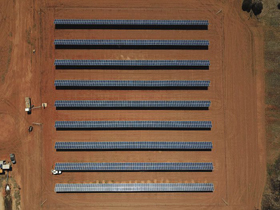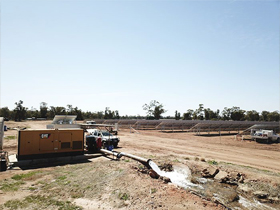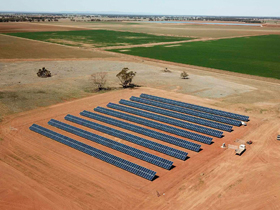Thanks to Dynapumps NSW, Narromine is now leading the way with Australia's largest 500kW Solar Diesel Hybrid Pump System for irrigated agriculture. Many gathered at local cotton grower Jon Elder’s Waverleigh property - 35 kilometres south-west of Narromine – to officially switch on Australia’s largest 500kW solar-diesel hybrid pumping system. Mr Elder who grows 550-570 hectares of cotton each year said that diesel was his most significant cost, stating he uses in the vicinity of 350,000 litres of diesel to pump their water. As a result, the decision was made to install a 500kW solar array to drive an irrigation pump previously run on diesel.
The system is not only expected to reduce diesel consumption used for irrigating the farm by about 50 per cent each year but also cut 500 tonnes of carbon dioxide entering the atmosphere annually. “It takes us about 100 litres of diesel to get one megalitre of water out of the ground,” Mr Elder said. “We consume 350,000 litres of diesel each year to move our water on this farm.”
“What this system means for us on this farm, is we’re going to half the amount of diesel that we use to move our water around and we think from those diesel savings alone that we’re going to pay back this investment in about five years,” he said. Mr Elder said while installing the system was a business investment, he is excited by the sustainable benefits it brings. The pump is a FLO-MAX 9 stg 14SM full bronze construction, complete with 90m of 10” column ,250kw 1450RPM and produces a performance of 185L/S @ 88m.
“While this was a straight business investment, which is why we got involved in this because the numbers stack up, what we’re excited about is some of the environmental benefits from this,” he said. “This will mean we produce 500 tonnes less of carbon dioxide each year, and that’s the equivalent of about 70 average Australian households.”



Ben Lee explained how the system works and said early adaptors had found the technology a critical factor in building drought resilience and overall farm viability. “What happens is early in the morning about 6.30am the sun picks the panels up, and then it will start blending with the diesel generator – so you’re substituting or boosting the solar with diesel in the morning,” Mr Lee said.
“By about 7.30am its running completely on solar, so the pump is delivering water consuming no diesel at all. “By 5 pm in September as the sun starts to drop down, the diesel generator will start and will boost the solar until about 7 p.m. when it becomes dark.
“At that point, you’ve got the option for the system to run on the generator, if you need to run 24 hours a day. If you don’t, the system turns off and starts the next day again,” Mr Lee explained. Looking at the irrigation industry, Mr Lee said less than half a per cent use solar power to run their pumps, but said the technology has much broader applications.
“The solar is simply a power source, and we design these systems to run the pumps that you have. So it doesn't matter what you’re growing and even if you are delivering water for a council or a mine or an industrial application it will work for that,” Mr Lee said. “A system this size would be able to pump enough water for a city the size of Orange, so you’re moving into municipal, industrial mining applications, which until proven it works on this scale, just wasn’t feasible,” he said.
Mr Elder said it was “pretty neat” to currently be the largest in Australia, but said that wouldn’t last long as the agricultural industry moves toward a more sustainable future. “It’s kinda neat to say we’re the biggest at the moment, but what’s even better is we’re not going to hold that for very long. There’s a lot of people interested in these developments, a lot of people in similar situations to us that this will work for them,” Mr Elder said.
“It demonstrates we’re at the forefront of cutting-edge technology and adopting the sorts of things which helps us move to a more sustainable future, so I think its a positive story for the cotton industry and farming in general. “It gives irrigators another option to help reduce their costs, and for ourselves, we’re not as exposed as we used to be to diesel price fluctuations. “So I think it offers a lot to other irrigators across the country.”
For more information on FLO-MAX pump products and to request a quote, contact Dynapumps on 1300 788 579 or email sales@dynapumps.com.au.
Source: Narromine News